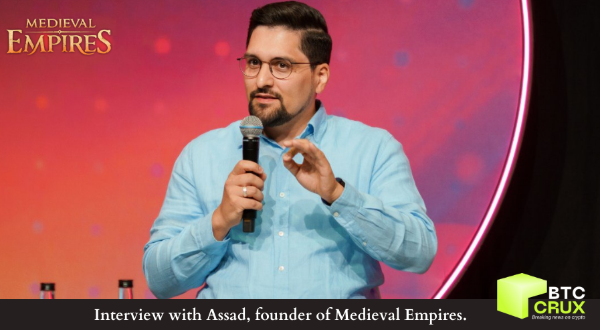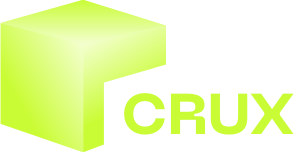
Decoding Medieval Empires: In Conversation with Co-founder Assad Dar
- summy Morphe
- July 28, 2023
- Interview
- 0 Comments
In a rapidly evolving digital landscape, gaming has truly come of age, combining technology, strategy, and storytelling to offer immersive experiences. At the epicenter of this convergence is Medieval Empires – a groundbreaking, mid-core multiplayer online strategy game steeped in history and powered by blockchain. The game offers players a chance to build, explore and conquer making full use of digital assets.
Today, we’re interviewing Assad Dar, the co-founder and Chief Visionary Officer of Medieval Empires, with over years of experience in digital domains, Assad has led organizations towards positive change and profitability. His vision drives the groundbreaking game. Let’s explore it’s unique “Play to Own” approach and the exciting opportunities it offers players, history enthusiasts, and blockchain aficionados alike.
- How does Medieval Empires leverage blockchain technology to offer a unique gaming experience, particularly with its “Play and Own” approach?
With the play and own approach, Medieval Empires is offering players true ownership of in-game assets by leveraging blockchain technology. They will be able to buy and sell these assets as NFTs on marketplaces just like any real-world asset and the proof of ownership would be through blockchain technology. These NFTs are also fully integrated with the gameplay and have in-game utility. For now, we have introduced Land NFTs in the game, but there will certainly be more NFTs to look forward to in the game.
- Medieval Empires is marketed as a “historical world, filled with exciting opportunities to play and own.” Can you elaborate on what you mean by “owning” in this context and how it interacts with NFTs?
Like mentioned in the previous answer, we are giving the players the opportunity to not only immerse themselves into this historical world of Medieval Empires by playing the game with their friends but also to be the true owner of the empires they will build in the game, as these lands will be digital assets (NFTs). These assets can be bought and sold on online NFT marketplaces such as OpenSea.
- Can you explain the rationale behind having both physical and digital NFTs within the game and what unique opportunities these offer to the players?
The rationale behind having both physical and digital NFTs is to create a dynamic and immersive gaming experience that bridges the gap between the virtual and real worlds. By integrating physical and digital NFTs, we offer unique opportunities to our players that enhance their gameplay and overall engagement.
By having physical NFTs, players can own tangible, real-world assets that represent their in-game achievements or items. Owning these physical NFTs not only adds sentimental value but can also hold intrinsic value if they are limited edition or rare items, which will also allow players to feel a more realistic immersive gaming experience.
- As CEO, how do you envision the future roadmap for Medieval Empires? What major updates or features can players look forward to?
Medieval Empires recently released the second Early Access version of the game with a lot of exciting updates like players being able to invite their friends on their lands, whitelisting our active community members and blockchain gamers, while enhancements to the game such as more animations and art work, leaderboards, daily missions etc.
We will continue to update the game with additional features based on our roadmap and feedback from the community. The next big milestone for us is the crypto release of the game in Q4 of 2023 and eventually the full public release of the game in early 2024!
- How are Medieval Empires’ game mechanics designed to ensure long-term player engagement and prevent player fatigue?
The world map in Medieval Empires will evolve with time, and more territories will be added as we expand the game world to include more factions. The players will also be able to participate in one-off and recurring events inspired from real history in the game (special battles etc), along with their daily missions and quests.
Currently, the game features the Kayi tribe and the Crusaders in the Anatolia region, and in the future, Mongols will be introduced as well. As we move forward, more factions will be introduced based on the territories players want to see in the game. This will ensure that there is new content coming in for the players and will keep the gameplay experience exciting and engaging.
Community feedback also plays a key role in Web3 gaming and our community has been actively participating in making the game better since the first early access back in March 2023.
- Could you explain more about the various types of missions and tasks players can engage with in Medieval Empires? How do these help to drive the game’s narrative?
In the current version, players will have to complete a set of daily missions in Medieval Empires in order to get rewards in terms of Silver. These missions will be refreshed every day and will be simple tasks like fighting invaders, upgrading buildings or units, producing resources etc. Other kinds of daily missions, story missions and tasks will be introduced in future updates. As mentioned above, there will be more event and location based events introduced in the game as we progress further with the expansion of our world map and game.
- What inspired the creation of Medieval Empires and how does it differentiate itself from other blockchain games on the market?
Gaming is a multi-billion dollar market spread across the world. With the addition of blockchain technology to the mix, there was a huge opportunity. There were a lot of blockchain games being made, most with the focus on play-to-earn, but we realised that simply focusing on the play to earn model would not be groundbreaking, which is why Medieval Empires is never referred to as play to earn, rather, it’s a play and own game.
Medieval Empires differentiates itself from similar blockchain projects in several ways. Firstly, our game stands out due to its historical background. Rather than being purely fictional, our inspiration comes from real history, featuring characters who actually existed. This unique aspect adds an extra layer of interest and relevance, particularly for those familiar with the historical context.
Furthermore, having an actor onboard with millions of fans globally provides us with our own USP right from day one. This gives us a distinct advantage in attracting new players at a lower user acquisition cost compared to other blockchain projects.
Moreover, we have always prioritised the ownership aspect of the game instead of focusing on play-to-earn mechanics. Our commitment to building an open player economy and making it easy for players to join sets us apart from others in the market.
- How does Medieval Empires’s philosophy guide your approach to balancing free-to-play elements with in-game purchases while shaping complex elements like land ownership, taxation, and trade in the game economy?
Our primary goal is to create a fair balance that encourages players to engage with the free aspects of the game while offering enticing incentives for in-game purchases. We ensure that the core gameplay mechanics are enjoyable and engaging for all players. In addition to that, players can earn Silver tokens by completing daily missions in the game and these Silver tokens can be used to purchase certain in-game items and upgrades.
We will also be adding a marketplace where these silver tokens and other in-game purchases will be available for those willing to accelerate their progress.
In Medieval Empires, land ownership is a fundamental aspect of the game’s economy and gameplay. Players have the opportunity to get Land NFTs and build their towns on it. They will also be able to invite other players on their land in return for taxes. The tax or rent amount set would depend on the player and how well they have kept their land in the game.
- The Medieval Empires team is made up of individuals from diverse backgrounds. How does this diversity contribute to the development and growth of the platform?
We have a very diverse team of individuals from all across the world and this has been really helpful in terms of the innovation and creativity aspect. Each team member brings in their unique experiences and approaches leading to more innovation in game development, marketing and art styles. And thanks to such a diverse team, we are able to ensure that the development process considers a wide range of player preferences and needs and allows for a more comprehensive understanding of our various global target markets.
- Medieval Empires offers players the opportunity to generate real-world value from their in-game activities. Can you discuss this in more detail and provide examples of how players can achieve this?
Yes, this refers, again to the concept of real ownership of digital assets. Players who own Land NFTs in Medieval Empires can allow other players to settle on their lands and charge them rent. Furthermore, these Land NFTs can be sold on marketplaces like any asset to generate real world value for the players.
- You mention that Medieval Empires is being built on the Polygon blockchain due to its numerous advantages, including low gas fees and eco-friendliness. How important is sustainability to your platform, and how do you plan to maintain it as the platform grows?
Our main organisational values consist of 3 pillars: People, Planet and Prosperity. The care for the planet was a key factor for us to incorporate an environmentally ethical blockchain solution for our game development. As a responsible gaming project, we recognize our role in minimising the environmental impact associated with blockchain-based games. And this is exactly why we chose the eco-friendly Polygon blockchain. Polygon’s Proof-of-Stake (PoS) consensus mechanism significantly reduces energy consumption compared to traditional Proof-of-Work (PoW) blockchains. This choice aligns with our sustainability goals, ensuring that our game operations have a smaller carbon footprint.
About the Founder:
Assad Dar – Co-founder and Chief Visionary Officer of Medieval Empires
Assad Dar is the Co-founder and Chief Visionary Officer of Medieval Empires, helming a cutting-edge mid-core strategy game that’s set to revolutionize the gaming world. With over 15 years of experience in the digital arena, he has been leading organizations into the future with one goal in mind: to drive positive change, profitability, and process improvement.
From implementing global strategies to digital transformation, marketing, and go-to-market strategies, Assad knows how to get results. He’s a master of change management, leading teams and departments through transitions with ease, and his areas of expertise are truly mind-blowing. Blockchain technology, game development, information technology, program and project management, leadership and team management, digital transformation and marketing, business and strategy planning, market analysis and research, and change management – Assad has proven experience of delivering results in all these areas. He has worked with conglomerates worth multi-billions and startups on both global and local levels. His focused approach to drive ROI, attract more customers, and grow revenue is exemplary and we at Medieval Empires are glad to have him at our helm.


